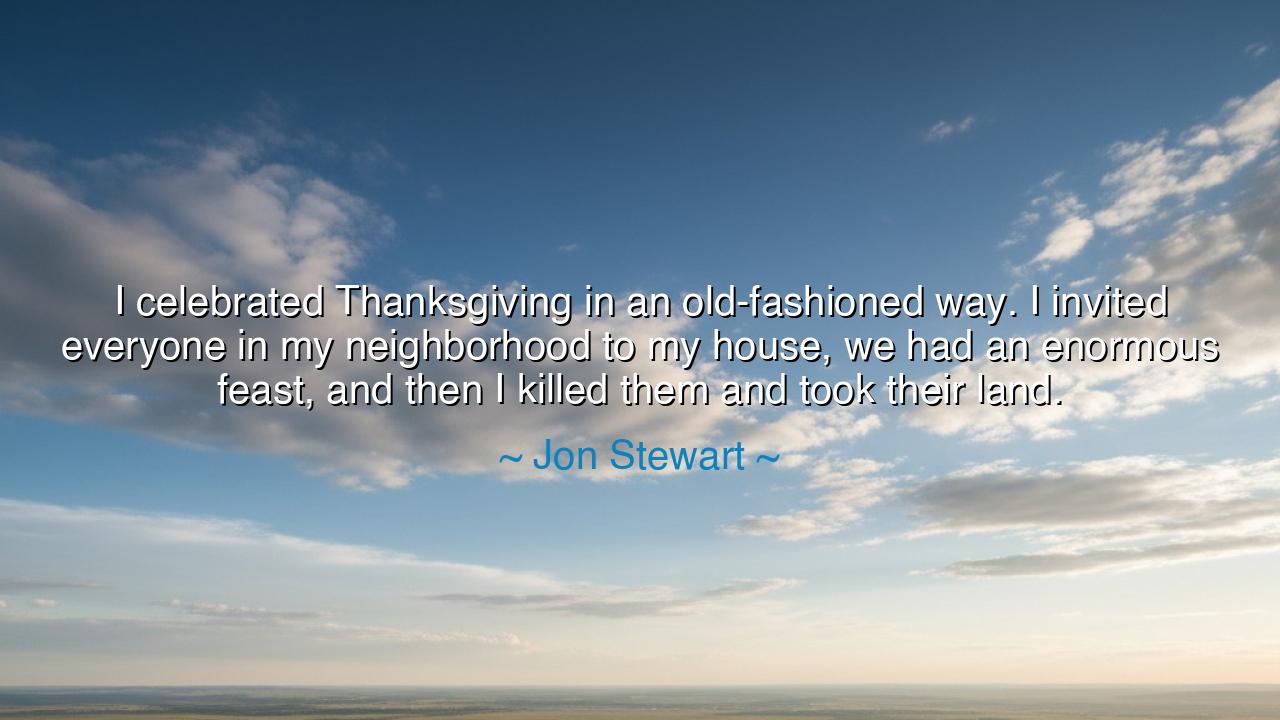
I celebrated Thanksgiving in an old-fashioned way. I invited
I celebrated Thanksgiving in an old-fashioned way. I invited everyone in my neighborhood to my house, we had an enormous feast, and then I killed them and took their land.






"I celebrated Thanksgiving in an old-fashioned way. I invited everyone in my neighborhood to my house, we had an enormous feast, and then I killed them and took their land." In this searing satire, Jon Stewart wields humor as a blade of truth, cutting through the comforting myths that often surround Thanksgiving. Beneath the jest lies a profound critique: that the holiday, while celebrated today as a feast of gratitude and unity, has its origin in a history marked by violence, dispossession, and the suffering of Indigenous peoples. Stewart’s words force us to confront the irony of celebrating harmony while forgetting the injustices woven into the fabric of the past.
The origin of this irony lies in the 17th century encounters between European settlers and Native Americans. The first shared harvest meal in Plymouth has been enshrined as a symbol of friendship, yet history reveals that the arrival of colonists led to waves of conquest, disease, and the taking of land that had been tended for generations by native peoples. Stewart, by exaggerating with dark humor, echoes the voices of historians and truth-tellers who remind us that the holiday cannot be understood fully without acknowledging the shadow that trails its light.
History offers stark examples of this reality. In 1637, following the Pequot War, the colonial governor of Massachusetts Bay declared a day of thanksgiving not for peace but for victory in battle and the massacre of hundreds of Indigenous people. This grim event reveals the deep contradiction between the spirit of gratitude we celebrate and the historical actions often taken in its name. Stewart’s words serve as a modern echo of this history, stripping away sentimentality to expose the wounds that still linger beneath the national myth.
Yet within satire lies the seed of transformation. Stewart’s humor shocks us because it is uncomfortably true, but its purpose is not despair. It is to awaken us, to strip away illusion so that we may see clearly and act justly. His parody of the "old-fashioned way" of celebrating is not a prescription for violence but a reminder that unless we acknowledge the wrongs of the past, we risk celebrating them unconsciously. The laughter he evokes is not without pain, but in that pain lies the possibility of change.
The lesson for future generations is this: gratitude must never be divorced from truth. To feast while forgetting the suffering that made the feast possible is to betray the very spirit of thanksgiving. True gratitude is honest; it honors not only blessings received but also the cost at which they came. To remember the land’s first keepers, to honor Indigenous voices, and to seek reconciliation—this is to transform Thanksgiving from an illusion into a sacred act of justice and humility.
Practical action follows: learn and teach the full history of Thanksgiving, not just its myths. At your table, remember the peoples who lived and thrived long before settlers arrived. Support Indigenous communities today, whose struggles for sovereignty, dignity, and cultural survival still continue. Let the feast be not only of food but of awareness, where gratitude becomes a bridge toward healing. In this way, humor’s sting can become wisdom’s balm.
Thus, Stewart’s satirical words become more than a joke—they are a call to awaken. They remind us that Thanksgiving cannot only be about turkey, family, and parades, but must also be about truth, justice, and remembrance. If we dare to hold both the joy and the sorrow together, then perhaps one day the feast will truly embody its name—a celebration not of conquest, but of genuine gratitude, peace, and belonging for all.






AAdministratorAdministrator
Welcome, honored guests. Please leave a comment, we will respond soon